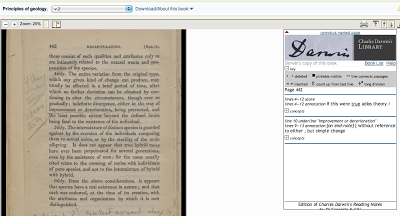Book of the Week: Celebrating Darwin’s Library!
“If this were true, adios theory.”
Such important words for Darwin, and so revealing to us. They offer us insight into the inner workings of this brilliant mind as he nursed to full fruition an idea that started on the now-legendary Galapagos Islands. Studying the works of the leading scientists of his time was critical to Darwin’s development of this idea. By applying, and sometimes countering, the theories of others, he constructed one of our most important scientific foundations – Evolution. He documented this intellectual progression in the margins of the books in his library. And this marginalia, and indeed digital scans of his personal library, are now available for you to peruse at your leisure on BHL in Charles Darwin’s Library!
Darwin’s personal library, which amounts to 1,480 books, is in the process of being digitized and made available online through BHL. Currently the collection includes 330 of Darwin’s most heavily annotated works. But what makes this collection so valuable, and indeed distinguishes it from the other 92,000+ volumes now on BHL, are the transcriptions of Darwin’s notes and comments, which are displayed to the right of each annotated page in BHL. These transcriptions, which are the result of work done by Mario A. DiGregorio and Nick Gill, are also fully indexed, meaning that you can search the library for any comments Darwin made in his books regarding a specific subject.

In celebration of the official release of this monumental project, we’re featuring the book in which Darwin so aptly summarizes the meat of his theory – Principles of Geology, v. 2 (1837), by Charles Lyell. Within the volume, Lyell postulates that there are definite limits to the variation of species, writing,
“The entire variation from the original type, which any given kind of change can produce, may usually be effected in a brief period of time, after which no farther deviation can be obtained by continuing to alter the circumstances, though ever so gradually; indefinite divergence, either in the way of improvement of deterioration, being prevented, and the least possible excess beyond the defined limits being fatal to the existence of the individual.”
In reaction, Darwin wrote in the margin, “If this were true, adios theory,” realizing that his proposal of evolution required that, given the right stimuli, organisms can adapt and evolve in infinite degrees as required for the continuation and prosperity of their species. Time and history favor Darwin, as we see that his studies on the variations within species, most famously the bird species he encountered in the Galapagos, ultimately supported the idea that all life originates from a common ancestor, implying unfathomable variations over time from the original.
As we celebrate Darwin, and the fact that he challenged the writings of others rather than saying goodbye to the delicate and sometimes elusive thoughts on adaptation that formed the seeds for his world-changing theory, we encourage you to take some time to look through the books in his library and the notes that he jotted down as he read through them. These notes comprise a history of his work, and provide us a window into those “eureka” moments that forever changed history.
Charles Darwin, we salute you.






Leave a Comment